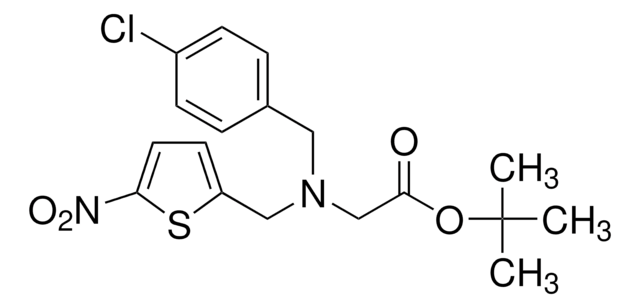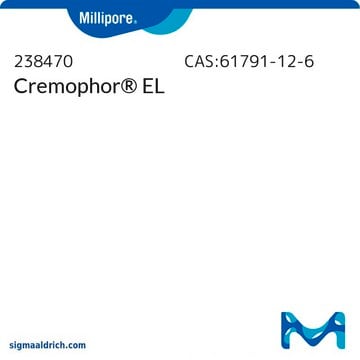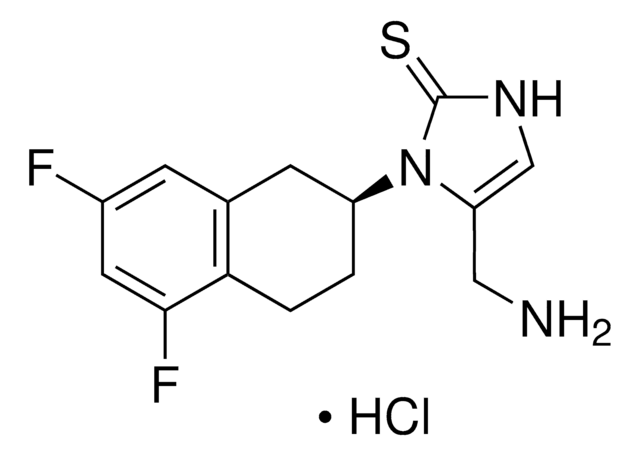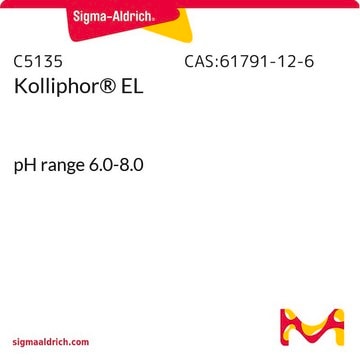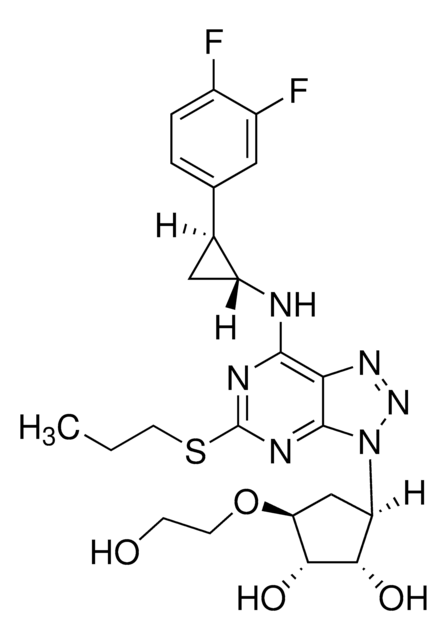SML2067
SR9011
≥98% (HPLC)
Sinônimo(s):
3-[[[(4-Chlorophenyl)methyl][(5-nitro-2-thienyl)methyl]amino]methyl]-N-pentyl-1-pyrrolidinecarboxamide
Faça loginpara ver os preços organizacionais e de contrato
About This Item
Fórmula empírica (Notação de Hill):
C23H31ClN4O3S
Número CAS:
Peso molecular:
479.04
Código UNSPSC:
12352200
NACRES:
NA.77
Produtos recomendados
Ensaio
≥98% (HPLC)
forma
powder
cor
white to beige
solubilidade
DMSO: 2 mg/mL, clear
temperatura de armazenamento
−20°C
Aplicação
SR9011 has been used as a nuclear receptor subfamily 1 group D member 1 (NR1D1) receptor agonist:
- to study its effects on microglial immune-metabolism
- to study its effects on insulin secretion from human type 2 diabetes islet cells
- to study its effects on thyroid-stimulating hormone β (TSHβ) gene expression
Ações bioquímicas/fisiológicas
SR9011 is a potent nuclear receptor REV-ERB agonist (EC50 of REV-ERBα- and REV-ERBβ-dependent repressor activity = 790 and 560 nM, respectively, by cell-based reporter assay) that stimulates REV-ERB-dependent target genes suppression both in cultures in vitro and in mice in vivo (100 mg/kg i.p., b.i.d.) without activity toward a panel of 46 other nuclear receptors. SR9011 is shown to modulate circadian behavior by suppressing the transcription factors BMAL1 (brain and muscle ARNT-like protein 1) and CLOCK (circadian locomotor output cycles kaput) as well as induce energy expenditure and weight loss by regulating genes involved in lipid and glucose metabolism in mice in vivo with good bioavailabiilty (plasma conc. = 0.53 and 15.3 μM 2 hr post 10 or 100 mg/kg i.p. dosage; brain conc. = 0.24 μM 2 hr post 10 mg/kg i.p.), while its structure analog GSK4112 shows no plasma exposure.
Palavra indicadora
Warning
Frases de perigo
Declarações de precaução
Classificações de perigo
Eye Irrit. 2 - Skin Irrit. 2
Código de classe de armazenamento
11 - Combustible Solids
Classe de risco de água (WGK)
WGK 3
Ponto de fulgor (°F)
Not applicable
Ponto de fulgor (°C)
Not applicable
Certificados de análise (COA)
Busque Certificados de análise (COA) digitando o Número do Lote do produto. Os números de lote e remessa podem ser encontrados no rótulo de um produto após a palavra “Lot” ou “Batch”.
Já possui este produto?
Encontre a documentação dos produtos que você adquiriu recentemente na biblioteca de documentos.
Irene O Aninye et al.
The Journal of biological chemistry, 289(24), 17070-17077 (2014-05-06)
Thyroid hormones (TH) are critical for development, growth, and metabolism. Circulating TH levels are tightly regulated by thyroid-stimulating hormone (TSH) secretion within the hypothalamic-pituitary-thyroid axis. Although circadian TSH secretion has been well documented, the mechanism of this observation remains unclear.
Sadichha Sitaula et al.
Biochemical pharmacology, 131, 68-77 (2017-02-19)
REV-ERBα and REV-ERBβ are heme regulated nuclear receptors that are known to regulate metabolic pathways. We previously demonstrated that treatment of mice with synthetic REV-ERB agonists suppressed plasma cholesterol levels and the hepatic levels of the rate limiting enzyme in
Laura A Solt et al.
Nature, 485(7396), 62-68 (2012-03-31)
Synchronizing rhythms of behaviour and metabolic processes is important for cardiovascular health and preventing metabolic diseases. The nuclear receptors REV-ERB-α and REV-ERB-β have an integral role in regulating the expression of core clock proteins driving rhythms in activity and metabolism.
Ryota Nakazato et al.
Glia, 65(1), 198-208 (2016-10-12)
Similar to neurons, microglia have an intrinsic molecular clock. The master clock oscillator Bmal1 modulates interleukin-6 upregulation in microglial cells exposed to lipopolysaccharide. Bmal1 can play a role in microglial inflammatory responses. We previously demonstrated that gliotransmitter ATP induces transient
Volodymyr Petrenko et al.
Proceedings of the National Academy of Sciences of the United States of America, 117(5), 2484-2495 (2020-01-23)
Circadian clocks operative in pancreatic islets participate in the regulation of insulin secretion in humans and, if compromised, in the development of type 2 diabetes (T2D) in rodents. Here we demonstrate that human islet α- and β-cells that bear attenuated
Nossa equipe de cientistas tem experiência em todas as áreas de pesquisa, incluindo Life Sciences, ciência de materiais, síntese química, cromatografia, química analítica e muitas outras.
Entre em contato com a assistência técnica